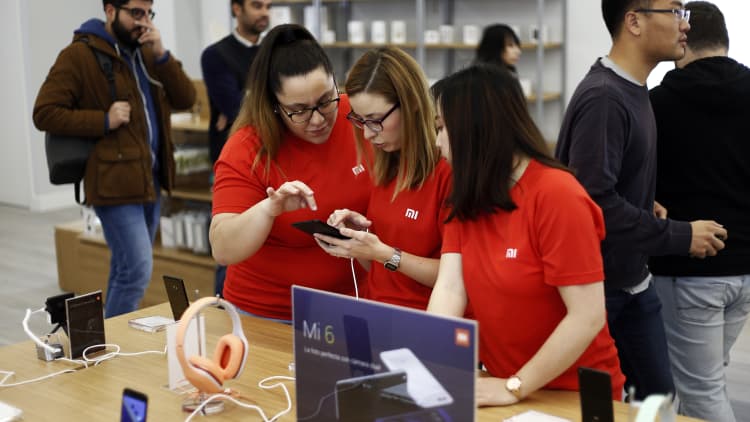
DAVOS, Switzerland — Xiaomi, one of the largest smartphone players in the world, is still hopeful of entering the U.S. market, despite the ongoing trade war between Washington and Beijing, a top executive told CNBC.
The Chinese consumer electronics company has been on a huge international expansion drive over the past few years, launching its products in India, Europe and other parts of the world. But it has yet to enter the U.S., a market dominated by Apple and Samsung.
In 2018, a senior executive at Xiaomi told CNBC that the firm was building its "resources" to enter the U.S. So far that has not happened.
But speaking to CNBC on the sidelines of the World Economic Forum in Davos, Shou Zi Chew, Xiaomi's president of international and current chief financial officer, said the U.S. was still in its sights. When asked if Xiaomi was still looking at the American market despite the ant-China sentiment and dominance of Apple and Samsung, Shou said the company was.
"The reality is that we are still a nine-year old company ... Our global expansion only started sometime in 2014, 2015. So we still need more time in order for us to grow into new markets," Shou told CNBC. "And in time, I would like us to grow into as many markets as we can so that we can provide our products to as many users as we can ... including the U.S."
Shou said that Xiaomi was in the "preparation stage" of entering the U.S.
Chinese brands are not completely shut out from the U.S. Lenovo is the third-biggest PC maker by market share, according to Gartner. And in smartphones, Lenovo, which owns the Motorola brand, is the fifth-biggest vendor in the U.S., according to Counterpoint Research.
However in 2018, Huawei attempted to launch its flagship phone in the U.S. via AT&T, but the deal fell through. Since then, Huawei has been the target of U.S. accusations that its networking equipment could be used for espionage by the Chinese government. Huawei denies these allegations.
Xiaomi has found success in several markets including India, where it is now the top smartphone player ahead of Samsung. Not only does it sell smartphones, but a range of other connected devices. Now the company is eyeing Europe, where it has been expanding since 2017.
"Over the course of the next few years, we're going to put an emphasis on Western Europe," Shou said, adding that the company will launch many new products in its international markets.






